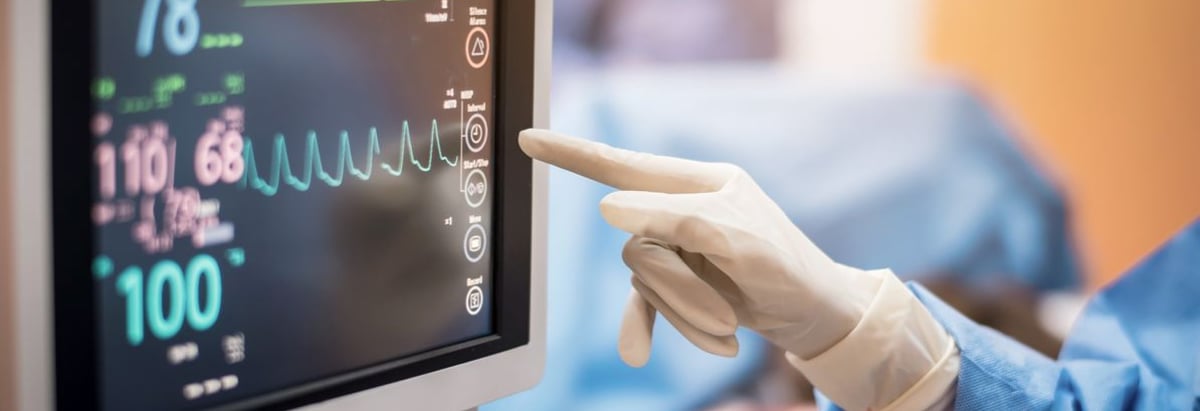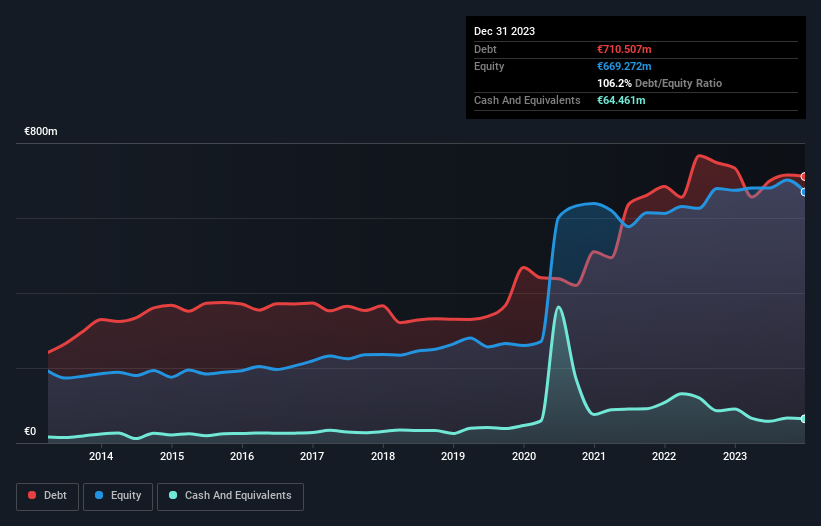- Germany
- /
- Healthtech
- /
- XTRA:COP
We Think CompuGroup Medical SE KGaA (ETR:COP) Can Stay On Top Of Its Debt

Legendary fund manager Li Lu (who Charlie Munger backed) once said, 'The biggest investment risk is not the volatility of prices, but whether you will suffer a permanent loss of capital.' It's only natural to consider a company's balance sheet when you examine how risky it is, since debt is often involved when a business collapses. We can see that CompuGroup Medical SE & Co. KGaA (ETR:COP) does use debt in its business. But should shareholders be worried about its use of debt?
When Is Debt Dangerous?
Debt and other liabilities become risky for a business when it cannot easily fulfill those obligations, either with free cash flow or by raising capital at an attractive price. Part and parcel of capitalism is the process of 'creative destruction' where failed businesses are mercilessly liquidated by their bankers. However, a more usual (but still expensive) situation is where a company must dilute shareholders at a cheap share price simply to get debt under control. Having said that, the most common situation is where a company manages its debt reasonably well - and to its own advantage. The first thing to do when considering how much debt a business uses is to look at its cash and debt together.
View our latest analysis for CompuGroup Medical SE KGaA
What Is CompuGroup Medical SE KGaA's Net Debt?
The chart below, which you can click on for greater detail, shows that CompuGroup Medical SE KGaA had €710.5m in debt in December 2023; about the same as the year before. However, it does have €64.5m in cash offsetting this, leading to net debt of about €646.0m.

How Strong Is CompuGroup Medical SE KGaA's Balance Sheet?
We can see from the most recent balance sheet that CompuGroup Medical SE KGaA had liabilities of €338.3m falling due within a year, and liabilities of €899.7m due beyond that. Offsetting this, it had €64.5m in cash and €248.8m in receivables that were due within 12 months. So its liabilities total €924.7m more than the combination of its cash and short-term receivables.
This is a mountain of leverage relative to its market capitalization of €1.41b. This suggests shareholders would be heavily diluted if the company needed to shore up its balance sheet in a hurry.
We use two main ratios to inform us about debt levels relative to earnings. The first is net debt divided by earnings before interest, tax, depreciation, and amortization (EBITDA), while the second is how many times its earnings before interest and tax (EBIT) covers its interest expense (or its interest cover, for short). Thus we consider debt relative to earnings both with and without depreciation and amortization expenses.
CompuGroup Medical SE KGaA has a debt to EBITDA ratio of 2.8 and its EBIT covered its interest expense 4.3 times. Taken together this implies that, while we wouldn't want to see debt levels rise, we think it can handle its current leverage. On a lighter note, we note that CompuGroup Medical SE KGaA grew its EBIT by 20% in the last year. If it can maintain that kind of improvement, its debt load will begin to melt away like glaciers in a warming world. There's no doubt that we learn most about debt from the balance sheet. But it is future earnings, more than anything, that will determine CompuGroup Medical SE KGaA's ability to maintain a healthy balance sheet going forward. So if you want to see what the professionals think, you might find this free report on analyst profit forecasts to be interesting.
But our final consideration is also important, because a company cannot pay debt with paper profits; it needs cold hard cash. So we always check how much of that EBIT is translated into free cash flow. Over the last three years, CompuGroup Medical SE KGaA recorded free cash flow worth a fulsome 87% of its EBIT, which is stronger than we'd usually expect. That positions it well to pay down debt if desirable to do so.
Our View
CompuGroup Medical SE KGaA's conversion of EBIT to free cash flow suggests it can handle its debt as easily as Cristiano Ronaldo could score a goal against an under 14's goalkeeper. But, on a more sombre note, we are a little concerned by its level of total liabilities. We would also note that Healthcare Services industry companies like CompuGroup Medical SE KGaA commonly do use debt without problems. All these things considered, it appears that CompuGroup Medical SE KGaA can comfortably handle its current debt levels. On the plus side, this leverage can boost shareholder returns, but the potential downside is more risk of loss, so it's worth monitoring the balance sheet. When analysing debt levels, the balance sheet is the obvious place to start. However, not all investment risk resides within the balance sheet - far from it. We've identified 2 warning signs with CompuGroup Medical SE KGaA , and understanding them should be part of your investment process.
When all is said and done, sometimes its easier to focus on companies that don't even need debt. Readers can access a list of growth stocks with zero net debt 100% free, right now.
If you're looking to trade CompuGroup Medical SE KGaA, open an account with the lowest-cost platform trusted by professionals, Interactive Brokers.
With clients in over 200 countries and territories, and access to 160 markets, IBKR lets you trade stocks, options, futures, forex, bonds and funds from a single integrated account.
Enjoy no hidden fees, no account minimums, and FX conversion rates as low as 0.03%, far better than what most brokers offer.
Sponsored ContentNew: AI Stock Screener & Alerts
Our new AI Stock Screener scans the market every day to uncover opportunities.
• Dividend Powerhouses (3%+ Yield)
• Undervalued Small Caps with Insider Buying
• High growth Tech and AI Companies
Or build your own from over 50 metrics.
Have feedback on this article? Concerned about the content? Get in touch with us directly. Alternatively, email editorial-team (at) simplywallst.com.
This article by Simply Wall St is general in nature. We provide commentary based on historical data and analyst forecasts only using an unbiased methodology and our articles are not intended to be financial advice. It does not constitute a recommendation to buy or sell any stock, and does not take account of your objectives, or your financial situation. We aim to bring you long-term focused analysis driven by fundamental data. Note that our analysis may not factor in the latest price-sensitive company announcements or qualitative material. Simply Wall St has no position in any stocks mentioned.
About XTRA:COP
CompuGroup Medical SE KGaA
Provides e-health services in Germany, Western and Eastern Europe, North America, and internationally.
Fair value with moderate growth potential.
Similar Companies
Market Insights
Community Narratives



